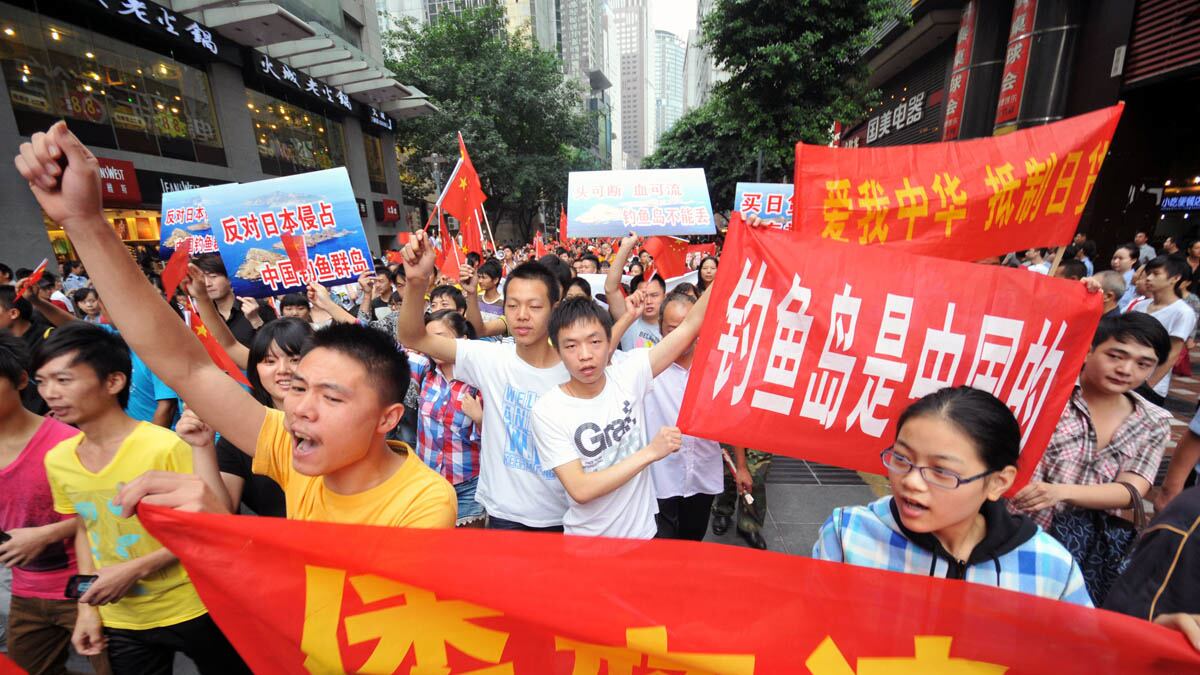The Chinese leadership already had its hands full with domestic scandals and political intrigue on the eve of a once-in-a-decade succession. Now it’s grappling with a wave of widespread street protests in reaction to the Japanese government’s recent purchase of islands claimed by both Tokyo and Beijing.

Over the weekend angry Chinese protesters set fire to a Panasonic factory and looted a Toyota dealership in the coastal city of Qingdao, prompting the temporary closure of some Japanese factories in China. Police used tear gas and water cannons on protesters in the Chinese southern city of Shenzhen. Several hundred people gathered near the Japanese embassy in Beijing, some pelting it with water bottles and eggs. Citizens have called for a nationwide boycott of Japanese-made goods and establishments.
It's difficult to prove that China’s jittery preparations for the coming succession have any link to the protests’ intensity. However, external pressures caused by Japan’s actions have clearly increased the stress on a regime besieged by multiple scandals and personnel jockeying in preparation for the 18th Communist Party Congress, expected in October or November. Dissident artist Ai Weiwei tweeted that advocates of keeping the domestic security portfolio in the new Politburo Standing Committee may use the protests to press their case. And some domestic editorials have alluded to the link between a hard-line foreign policy stance and domestic self-confidence. A Global Times editorial declared, “China will not shy away if Japan chooses to resort to its military ... for China, triumphing will cement cohesion and public confidence in the country. We cannot back off.”
It is self-evident that China’s growing interdependence with the outside world has allowed international factors—some individual, some diplomatic—to impact what used to be heavily cloistered political machinations in the bad old days of Mao Zedong. For example, Tuesday will see the opening of the trial of former top cop Wang Lijun, who sought temporary refuge in the American consulate in Chengdu in February. His reason for entering the consulate, and disclosing explosive details about then-Politburo member Bo Xilai, was that he feared for his life because he knew too much about the plot by Bo’s wife to poison British businessman Neil Heywood over a business dispute. In Mao’s day it would have been unthinkable to have foreigners so integrally involved in such a sensitive, high-level scandal.
To preempt any criticism of being “weak” in the face of external aggression, Chinese state media has taken a sympathetic tone toward the protests in recent days. A signed editorial on the website of the communist party mouthpiece People’s Daily declared “a people that have no guts and courage is doomed to be bullied, and a country that always hides low and bides its time will always come under attack.” The last phrase is a veiled barb at the principle of hiding one’s strengths in the shadows while building up one’s capabilities, a strategy employed by the late leader Deng Xiaoping, especially in regard to the Chinese military.
This weekend’s saber-rattling was accompanied by the arrival of six Chinese marine surveillance ships within a few nautical miles of the Diaoyu islands on a patrol that Tokyo saw as “unprecedented.” The patrol, which Beijing said was a “law enforcement mission,” was clearly a demonstration of China’s commitment to reasserting sovereignty over the islets. In the midst of the tensions, U.S. Defense Secretary Leon Panetta arrived in Tokyo Sunday, and is slated to hold talks with Chinese officials in Beijing Tuesday. He insisted that the U.S., which has a military alliance with Japan, was not taking sides in the territorial dispute. Panetta called for a diplomatic solution and warned that “miscalculation” by either side “could result in violence and ... conflict.” The controversy has also erupted at a bad time for the Japanese government, whose newly appointed ambassador to China died Sunday after falling ill last week.
The immediate trigger for the protests was the Japanese government’s decision to “nationalize” the uninhabited islands in the East China Sea, called the Senkakus by Japanese and the Diaoyu by Chinese. Earlier this month the Japanese government purchased three of the five islands from a private family which declared itself the “rightful owner.” (Tokyo was hoping to preempt a more nationalistic potential buyer from making the purchase.) But China’s foreign ministry accused Tokyo of “stealing” the Diaoyu islands and tensions have escalated sharply ever since.
Sino-Japanese frictions would be on the uptick about now even without the Diaoyu brouhaha. Sept. 18 is the anniversary of an incident in 1931 in which Japanese troops attacked Chinese barracks in Shenyang, once called Mukden. This clash was the opening salvo of the Japanese invasion and occupation of Northeast China, which didn’t end until the end of World War II in 1945—and it still evokes strong nationalistic feelings in a population keen to pounce on opportunities to target things Japanese in a bid to make up for past humiliations.
In this case, the targets have been Japanese citizens, factories, stores, and vehicles. The Japanese prime minister asked Chinese authorities to protect Japanese people and facilities in China. “Regrettably, this is a problem concerning the safety of Japanese nationals and Japan-affiliated companies,” he told the Japanese broadcaster NHK. Chinese foreign ministry spokesman Hong Lei advised mainland citizens to “express their appeals in a rational and legal way.”
However, the Chinese government cannot seem too protective of Tokyo, lest domestic anti-Japanese sentiment morph into anti-government rage. Beijing needs to be skillful as it juggles its need to be seen as a responsible and law-abiding diplomatic player with its desire to win friends and influence people on the street.






